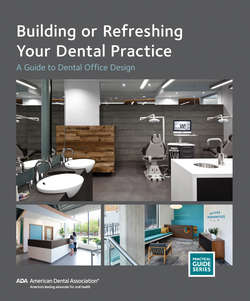Читать книгу Building or Refreshing Your Dental Practice - American Dental Association - Страница 19
На сайте Литреса книга снята с продажи.
Contractor
ОглавлениеTenant improvement costs will likely be the single biggest expense you will incur when opening your new dental office. They are also the expense that can fluctuate the most from the beginning to the end of your project, often wreaking havoc on your budget.
Hire a contractor who has experience building dental offices. An inexperienced company may underbid the project, not fully understanding its complexities and underestimating the time necessary to complete your project. If you live where experienced contractors are unavailable, it becomes even more important for you to get everything on paper to avoid expensive change orders.
Ask contractors for a bid that includes a full-time superintendent. A salaried employee of the construction company that you hire, the superintendent is the most important person involved with the construction of your project. He or she is responsible for ensuring that all the tenant improvements are built according to your plans and making sure that none of the subcontractors deviate from the plans to save costs. The superintendent coordinates all the various subcontractors and makes sure they show up as scheduled. He or she is the person who works closest with your dental equipment consultant/ supplier to make sure your equipment requirements are met. Warning: When a construction company takes on more projects than it can handle, the superintendent will often end up being assigned to several projects at once, leaving you with only a part-time manager. Inevitably, less supervision over the numerous subcontractors involved means more mistakes and delays during tenant improvements.
Hire a contractor who has experience building dental offices. An inexperienced company may underbid the project, not fully understanding its complexities and underestimating the time necessary to complete your project.
Avoiding change orders saves significant backend construction costs. You can also save additional costs on the front-end of your project. When you and the architect made decisions during the design phase of your plans, many may have been based on esthetics, without you really knowing the total cost. If even the lowest bid ends up being higher than your budget, value engineering can play an important role in bringing that cost back in line. When value engineering, the contractor will make suggestions about what you can substitute in place of the design decisions specified in your plans and tell you the resulting lower costs involved. Most contractors are familiar with the cost of materials. A contractor who is good at value engineering can save you a lot of money, and it only costs the contractor a little bit of time. Of course, for this to work, you are going to have to make concessions with your previous design decisions.
Sometimes a dentist will already have a relationship with a contractor he or she likes, or has the name of one highly recommended by a trusted colleague, and may elect to bypass the traditional bidding process. This can be to the dentist’s advantage, but only if the contractor is willing to attend all the design phase meetings with the dentist and the architect. If the dentist clearly states a budget for tenant improvement costs, the contractor can concurrently value engineer the project as the design phase progresses, guiding the dentist and architect in making decisions that keep final costs on target. In the construction industry, this process is called a negotiated bid.
One other tip for protection against financial catastrophe: Insist that your contractor purchase performance bonds and payment bonds that guarantee contractor performance and shield the dentist from contractor default. The American Institute of Architects (A.I.A.) has standardized performance bonds and payment bonds that guarantee contractor performance and shields the dentist from contractor default. Insist that your contractor purchase these standardized bond forms used by the A.I.A., which have repeatedly held up in court and passed the test of time.
When you and the architect made decisions during the design phase of your plans, many may have been based on esthetics, without you really knowing the total cost. If even the lowest bid ends up being higher than your budget, value engineering can play an important role in bringing that cost back in line.
